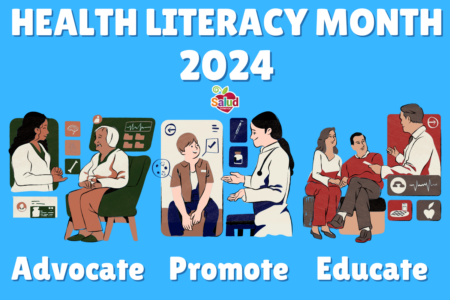
Share On Social!
Everyone deserves health equity – a fair, just opportunity to be their healthiest.
But the reality of U.S. healthcare is that people of color, including Latinos, face higher risk for life-threatening diseases than their white peers due to systemic inequities in education, housing, food, healthcare, and more.
While these inequities threaten health outcomes, efforts are rising to close the gaps.
Genentech, a member of the Roche Group, along with The Genentech Foundation, has been on the front lines of the health equity crisis, advocating for equitable treatment and representation for the last several years.
This includes the company’s multimillion-dollar Health Equity Innovation Fund.
Launched in 2019, the Health Equity Innovation Fund has given grantees the funds to address key components of healthcare inequities, such as racism in scientific research, healthcare delivery, and education.
Genentech recently announced its fourth round of funding in the form of $10 million to 10 or more recipients, bringing its total to $50 million awarded to over 100 grantees.
“By leveraging charitable giving to uncover and address the root causes of disparities in healthcare and education, and working together to commit to change ─ I believe we have a real chance at true progress,” said Kristin Campbell Reed, a leader at Genentech and The Genentech Foundation, in a 2021 editorial.
Health Equity Innovation Fund
For the 2024 Innovation Fund, Genentech is in search of projects specifically focused on neuroscience and brain health, including multiple sclerosis, oncology, such as breast, lung, and hepatocellular carcinoma, ophthalmology, and cardiovascular and metabolic disease like diabetes, hypertension, and obesity.

Program areas to be considered include:
- Increasing rates of screening and diagnosis while promoting care continuity.
- Widening the capacity and accessibility of clinical services and linkages to critical non-clinical services.
- Enhancing the quality, safety, and experience of care for patients and promoting adherence and satisfaction.
- Shifting institutional and system-wide policies and practices to deepen long-term accountability for equity.
- Increased training program capacity and matriculation and completion rates for practitioners/clinicians who are underrepresented in medicine and clinical care delivery.
- Increased retention, reduced turnover, and increased satisfaction of physicians, researchers, and clinical support staff.
“We prioritize funding for teams with bold new ideas and firsthand experience with the equity challenges their work addresses. This has included efforts to increase clinical study enrollment, improve health equity and anti-racism education for future healthcare providers, diversify the nursing workforce and more,” according to the funding webpage.
In addition to funding, grantees will also be allowed to take part in a multi-year learning cohort “where they can connect with each other and Genentech leaders to build community, share emerging insights, source new ideas and contribute to fieldwide learnings to facilitate greater collective impact.”
Genentech will accept applications until Monday, April 15, 2024, at 11:59 p.m. PT.
Click here for detailed information about the proposal process, selection criteria, and grant funding, or apply here.
Salud America! & Genentech
As part of Genentech’s Health Equity Innovation Fund grantees in 2021 Salud America! received a three-year, $650,000 award to create digital research, tools, and stories that encourage Latino participation in cancer and Alzheimer’s disease clinical trials.
Since then, Salud America! has produced over 100 blog posts on clinical trials and cancer, which have amassed over 24,000 views as of September 2023, eight Tweetchats with a total of over 49 million impressions, and six webinars, including one on implicit bias.
For example, the Salud America! team:
- Built a landing page for clinical-trial-related content.
- The team created a fact sheet promoting biospecimen donation in English and Spanish.
- Helped create a bilingual video about clinical trials for Latinos.
- Launched an action pack to help healthcare workers rewire their implicit bias.
The team also continues to share the motivational stories of real Latinos who have experienced the benefits of participating in clinical trials or research programs, such as:
- “I couldn’t Feel More Blessed”: How Amber Lopez Found Hope Through Her Cancer Journey
- ‘It Helped Me Because I’m Here’: Why Diana Lopez Chose a Clinical Trial
- ‘Maybe I can Help Somebody Else’: Willie Heard’s Unwavering Faith Through Clinical Trials
Visit UT Health San Antonio’s Glenn Biggs Institute for Alzheimer’s and Neurodegenerative Diseases website to view their available clinical trials and eligibility requirements.
Search the Mays Cancer Center at UT Health San Antonio’s Find a Clinical Trial database to learn more about available clinical trials and eligibility requirements.
Seek a cancer trial anywhere in the nation here.
“We continue to work on the important task Genentech chose us to do – bringing more Latinos and diversity to cancer and Alzheimer’s clinical trials, which can help researchers save more lives,” said Dr. Amelie G. Ramirez, director of Salud America! and the Institute for Health Promotion Research in the Department of Population Health Sciences at UT Health San Antonio.
Explore More:
Health EquityBy The Numbers
25
years
of life expectancy between some U.S. cities.




… [Trackback]
[…] Read More: salud-america.org/dr-francisco-g-cigarroa-the-first-latino-chancellor-of-the-university-of-texas-system/ […]